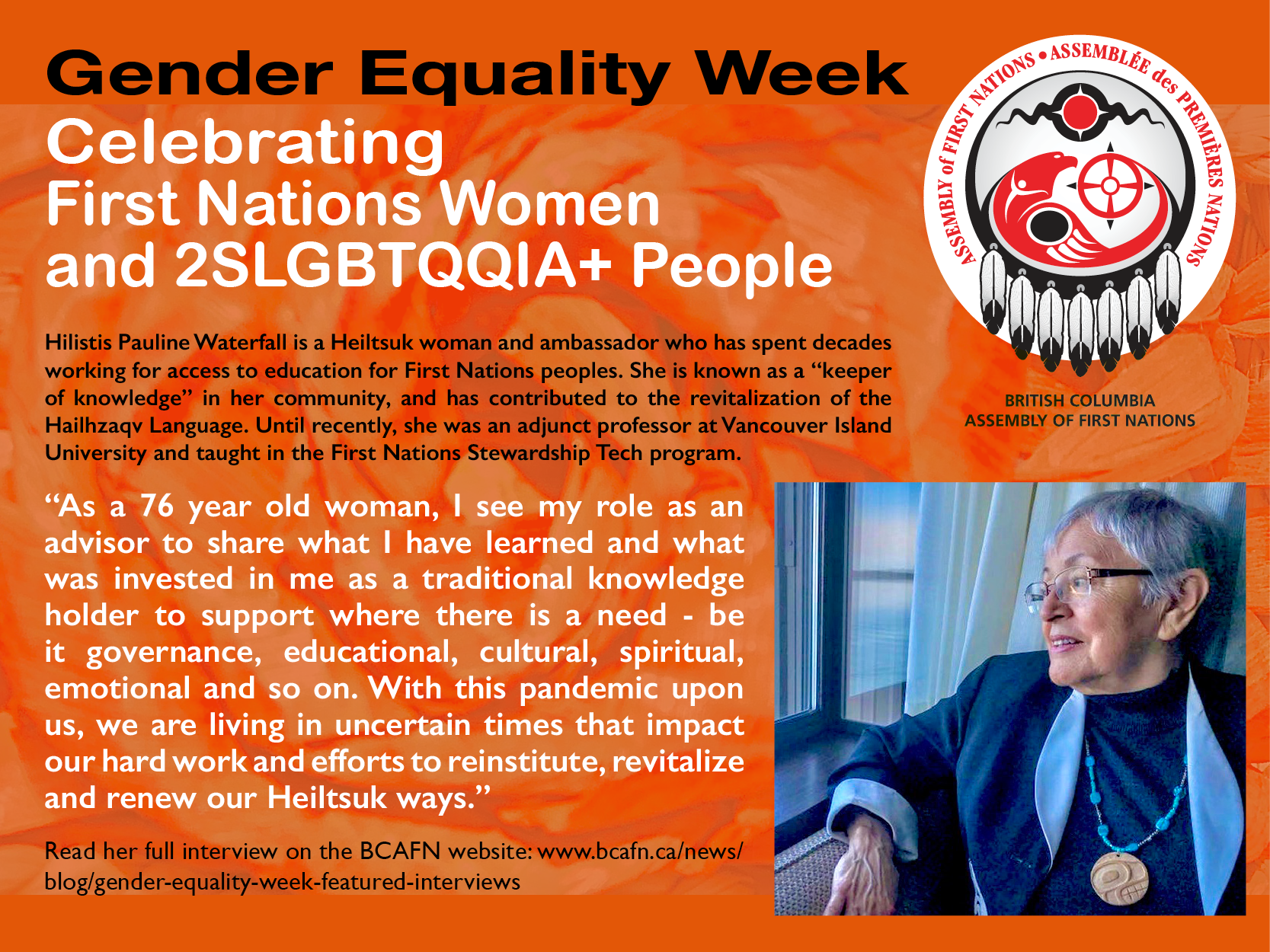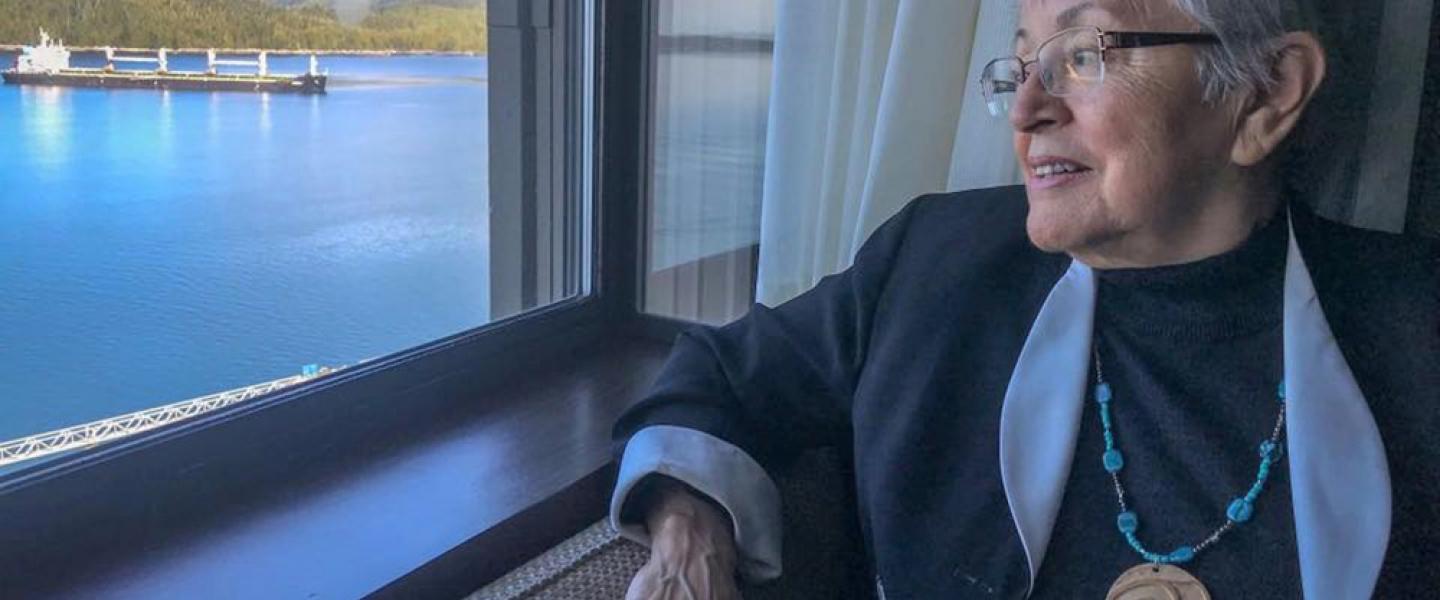Gender Equality Week
Celebrating First Nations Women: Hilistis Pauline Waterfall
Hilistis Pauline Waterfall is a Heiltsuk woman and ambassador who has spent decades working for access to education for First Nations peoples. She is known as a “keeper of knowledge” in her community, and has contributed to the revitalization of the Hailhzaqv Language. Until recently, she was an adjunct professor at Vancouver Island University and taught in the First Nations Stewardship Tech program.
Can you share about what you are currently up to, and what you see as your role in the broader community?
As a 76 year old woman, I see my role as an advisor to share what I have learned and what was invested in me as a traditional knowledge holder to support where there is a need - be it governance, educational, cultural, spiritual, emotional and so on.
With this pandemic upon us, we are living in uncertain times that impact our hard work and efforts to reinstitute, revitalize and renew our Heiltsuk ways.
Mrs. Waterfall recounted how, as a residential school survivor who spent many years disconnected from her community and culture, one of the things that helped her reconnect with the Heiltsuk way of knowing was being prompted with the question, “What mind are you in? Turn your Heiltsuk mind on.” This reminded her to acknowledge the impact that 150 years of colonialism had on her way of seeing the world, and encouraged her to ask questions to learn more about Heiltsuk worldviews.
How do you see the role of women and gender-diverse individuals in your community evolving?
In 1994, I was privileged to undertake a Royal Commission on Aboriginal Peoples project that looked at Traditional Roles & Responsibilities of Heiltsuk Women in our society. With that project, I was able to interview and learn from several Heiltsuk women who have now passed away. In this project, I learned that there wasn’t a definitive role per se for women and that our society wasn’t prescriptive in the role for gender-diverse individuals with regard to community structure and systems. In general, we had a holistic system where everyone, including children and youth had roles and responsibilities that worked in unity for our highest good.
The Indian Act impacted our traditional ways of governance and displaced the roles of women and youth. We are in the processes of re-integrating our governance structures.
Specifically, can you speak to your work to complete the Heiltsuk Nation’s circle of governance with the matriarchs in your community?
I am currently working with a colleague to draft a Heiltsuk Constitution. It became evident that there wasn’t a place within our governance system that included women with regard to decision-making, law-making or policy-making. Our high-ranking Chief, Woyala, before his passing raised this omission when signing our Heiltsuk Declaration on Title and Rights. He implored us to be inclusive of our women because their inherent roles and responsibilities were critical to the circle of supports and systems that kept our community intact and well-balanced. With the support of our leadership, we agreed upon the inclusion of a Mn’yaqs Council – Mn’’yaqs means “one with you” specifically in reference to our women. With the input and advice of our matriarchs, I created the terms of reference for this Heiltsuk Women’s Council which have now been included in our draft Constitution. With that, it is incumbent upon our elected tribal council to acknowledge and include the Mn’yaqs Council as part of its governance system much the same way that Heiltsuk Chiefs are included in joint leadership.
What inspires and motivates you in the day to day?
My 93 year old mother inspires me. Regardless of health challenges, she continues to stay active. We bake bread together. She has taught me how to make pie crust recently. We clean cooked crabs together. We share stories. My grandchildren inspire me. They range in age from 6 – 25 years and bring joy and purpose to my life. I recently became a great grandmother and our 6 month old Zakoiyah is an incredible little human who is loved and cared for in amazing ways. Waking up each day and doing prayers and meditation together with yoga inspires and motivates me. My son returning home as a trained linguist to teach our language and save it from extinction inspires me. I was strapped for speaking my language and he is helping me to remember and speak it once again, albeit hesitantly and slowly.
What has been a challenge you have experienced as an Indigenous woman, and how did you work through, or overcome this challenge?
I married a non-First Nations man and lost my Heiltsuk status from 1966 to 1985. During this time, I couldn’t live in my home community because I was no longer a Heiltsuk status person. So, my husband built a floating home that was moored in a marina adjacent to our community. Our three children and I commuted to work and school daily. The old people of the community reinforced that no matter what, I am Heiltsuk regardless of what a disenfranchisement certificate notes. I gravitated to old people who acknowledged my place and role and together we worked on many fronts to rebuild our community systems including our culture and potlatch. I became a born-again Indian in 1985 and we were able to move into the reserve and into the home that we had built and continue to live in.
How do you practice self-love, self-respect, and self-care?
I spend quality time with myself for at least 5 minutes at the beginning of each day. I meditate and do yoga. We have a boat and are privileged to get out on our traditional homelands and water. That has been my medicine for renewal and balance. We crab and prawn fish, we troll for salmon, jig for halibut and cod, pick seaweed and go for family picnics in some isolated beaches away from the busyness of life. I love to garden and read. Spending time with my mother is also important medicine for me.
Can you share some words of encouragement to other women and 2SLGBTQQIA+ individuals?
Traditionally, the lines between genders and sexual identifies have been blurred because we understood that everyone is a human being of worth and important to our whole. Each is born with a talent or gift that is nurtured and drawn upon to strengthen our whole. In the last decade, we’ve had same-sex marriages in our community that include blended families. In essence, we are all human beings with the same needs and responsibility to take care of each other.
Mrs. Waterfall shared that it is important to keep everything in perspective, “No matter what’s going on, there is always a greater purpose and learning. Nothing is permanent.” She explained that while this pandemic is robbing us of many things, First Nations people have always known how to adapt and retain what is important. This is what keeps us alive. This is a time to look inward and draw on creativity and our strength.
How can men become allies and practically support gender equity?
Genetically, we are wired not to distinguish between genders, knowing that each is as important as the other to provide support and strength in our lives as individuals and as a community. The work of men generally was outside of the home and that of women was inside the home. Both genders worked in collaboration to maintain the health and wellbeing of the community. Today, there really isn’t a need to nurture a model of ally because we’re all in this together and traveling in the same canoe paddling to our common goal and vision. Our common goals and vision are to continue to adapt, heal, reinforce and strengthen who we are as indigenous people who have survived all attempts to alienate, separate, assimilate and eradicate us. We are still here. We are strong. We are becoming more united.
Mrs. Waterfall emphasized that acceptance and empathy toward one another is key, and that everyone has the capacity for this, “We are all inherently supporters of one another as First Nations peoples, and must show respect and care.”
Check out BCAFN staff biographies here


